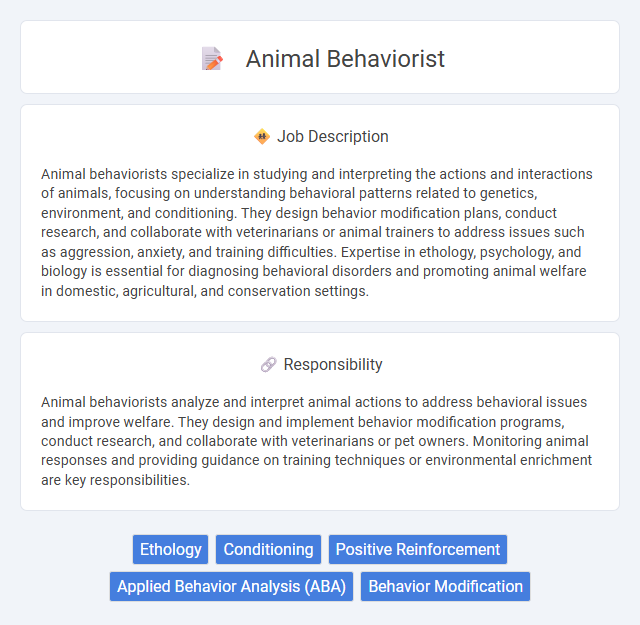
Animal behaviorists specialize in studying and interpreting the actions and interactions of animals, focusing on understanding behavioral patterns related to genetics, environment, and conditioning. They design behavior modification plans, conduct research, and collaborate with veterinarians or animal trainers to address issues such as aggression, anxiety, and training difficulties. Expertise in ethology, psychology, and biology is essential for diagnosing behavioral disorders and promoting animal welfare in domestic, agricultural, and conservation settings.
People with strong empathy and patience are likely to be well-suited for a career as an animal behaviorist, as the role often demands understanding complex animal behaviors and working closely with both animals and their owners. Individuals who possess analytical skills and a background in biology or psychology may find it easier to excel, given the scientific nature of the field. Those who are uncomfortable with unpredictable animal interactions or lack adaptability might find this job challenging and less suitable.
Qualification
An animal behaviorist typically holds a bachelor's degree in biology, psychology, or animal science, often complemented by a master's or doctoral degree specializing in animal behavior or ethology. Certification through organizations such as the Animal Behavior Society or the International Association of Animal Behavior Consultants enhances professional credibility and expertise. Practical experience with animal training, behavioral assessment, and data analysis is essential for successfully diagnosing and modifying animal behavior patterns.
Responsibility
Animal behaviorists analyze and interpret animal actions to address behavioral issues and improve welfare. They design and implement behavior modification programs, conduct research, and collaborate with veterinarians or pet owners. Monitoring animal responses and providing guidance on training techniques or environmental enrichment are key responsibilities.
Benefit
An animal behaviorist likely offers significant benefits by improving the well-being and mental health of animals through behavior modification techniques. Their expertise may help pet owners and animal care professionals address problematic behaviors, increasing safety and harmony in human-animal interactions. Employing scientific methods, they probably contribute to enhanced animal training, welfare, and overall quality of life.
Challenge
The job of an animal behaviorist likely involves challenging situations requiring deep understanding of diverse species and their unique behaviors. It may demand the ability to analyze complex behavioral patterns and develop customized intervention plans. Handling unpredictable animal reactions and ensuring safety could frequently test problem-solving skills and patience.
Career Advancement
Animal behaviorists can advance their careers by pursuing specialized certifications, such as the Certified Applied Animal Behaviorist (CAAB) credential, which enhances credibility and job prospects. Gaining experience through research, clinical practice, or wildlife studies facilitates progression into senior roles, consulting, or academic positions. Continuing education and publishing findings in scientific journals further establish expertise and open opportunities for leadership in animal welfare organizations.
Key Terms
Ethology
Animal behaviorists specializing in ethology study the natural behavior of animals in their environments, focusing on instinctual, social, and adaptive actions. They analyze patterns such as mating rituals, territoriality, and communication to understand species-specific behavioral drives. Their research often informs wildlife conservation, animal training, and improving human-animal interactions.
Conditioning
Animal behaviorists specializing in conditioning apply principles of classical and operant conditioning to modify animal behavior effectively. They design behavior modification plans using reinforcement, punishment, and desensitization techniques to address issues such as aggression, anxiety, and training challenges. Expertise in conditioning allows these professionals to improve animal welfare, enhance training outcomes, and facilitate positive human-animal interactions.
Positive Reinforcement
Animal behaviorists specializing in positive reinforcement employ scientifically-backed techniques to modify and enhance animal behavior through reward-based training. They design customized training programs that encourage desirable actions by systematically providing treats, praise, or toys, promoting lasting behavioral changes without fear or intimidation. This approach improves animal welfare, strengthens human-animal bonds, and effectively resolves common behavior problems such as aggression, anxiety, and obedience issues.
Applied Behavior Analysis (ABA)
Animal behaviorists specializing in Applied Behavior Analysis (ABA) use data-driven techniques to modify animal behaviors through positive reinforcement, focusing on improving communication and reducing problematic actions. These professionals apply principles of learning theory to develop customized behavior intervention plans for pets, zoo animals, and service animals. Expertise in ABA allows them to analyze behavioral patterns scientifically, enhancing animal welfare and human-animal interactions effectively.
Behavior Modification
Animal behaviorists specialize in analyzing and modifying animal behavior through techniques such as positive reinforcement, desensitization, and counter-conditioning. Their work involves assessing behavioral issues, developing customized intervention plans, and collaborating with pet owners or trainers to implement effective behavior modification strategies. This role requires a deep understanding of ethology, psychology, and often involves hands-on experience with a variety of species to improve animal welfare and human-animal relationships.
 kuljobs.com
kuljobs.com